Ancient Detective (2020) The Puppet Motif *Spoilers*
This post is an in-depth analysis of a recurring idea that plays out in the drama. Therefore it contains spoilers about the details of the plot and outcomes of the drama. It is strongly recommended that you not read this if you haven't seen the entire drama.
It occurred to me after the series finale when the identity of Wang Hua is revealed in not just one but two fascinating twists that the theme of freedom (especially individual liberty) finds intriguing expression in the exploration of the "puppet" motif. The motif works on different levels. As a literal, concrete plaything, as a metaphor for a form of indentured slavery and as a more Frankensteinian realisation -- being the creation of a person who wields immense power for good or for ill. The idea of a puppet is that of a lifeless doll that moves at the mercy of another with no will of their own. A puppet acts in accordance to how it is directed by the controller whether it be through some kind of mechanism or through the use of deception. It symbolizes the very opposite of free will, freedom, self-expression.
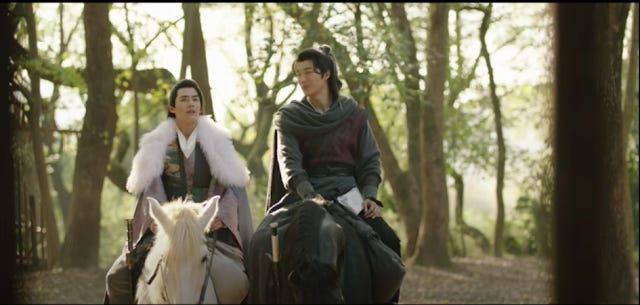
*Spoilers ahead*
According to the show's mythology, Wang Hua is a terror of the martial arts world (jiang hu) who was defeated 8 years earlier in Shenji Valley but his body, it seems, has gone missing. The show's protagonist, Jian Bu-zhi is concerned that he might still be alive so he sets out from the valley as a detective and a truth seeker. What's particularly suggestive is that Jian, though supposedly present 8 years earlier at the battle, has lost all his memories of the event and anything else before that fateful day. Only by reading the notes and diaries of his father, Jian Jin-huan, a legendary sleuth in the martial arts community, who died in the carnage, has he been able piece together some aspects of the puzzle.
*Ending spoilers ahead*
It turns out that Jian is not who he thinks he is but that he is in actual fact the Wang Hua that terrorized jiang hu 8 years earlier. However, the other twist that follows is that he isn't actually Wang Hua either but a puppet that was assuming the identity of Wang Hua. Wang Hua it seems, was a mind-controlled super soldier deployed by a shadowy figure who presumably used the Wang Hua persona to create chaos in that world. In effect, Wang Hua may not be a real person but a puppet of an unknown antagonist that remains a mystery at the drama's conclusion.
The irony of course is that our Jian Bu-zhi who identifies himself as the biological son and intellectual heir to Jian Jin-huan's legacy through the latter's writings actually becomes his true successor when he goes tabula rasa. Or not. Whoever his original controller or master might be, this Jian breaks free of his programming to gradually live up to the legacy and the legend. We don't know what he was like before he became a puppet but that matters little at this point. As Beggar Chief Hu says, what's really crucial is that Jian epitomizes the values of the late Jian Jin-huan who in turn personified everything that was good, true and heroic about jiang hu. According to him, the real identity of Jian Bu-zhi doesn't matter. It's what he does in present trajectory and what he symbolizes that count. He is the man that jiang hu desperately needs.
This Jian that we come to know and love somehow managed to break free of whatever influence his controller wielded and chose to take the righteous path. To promote truth seeking and universal justice. In the same way, his love interest, Zhan Shi-qi who was a nameless assassin with a number was raised to be a soulless puppet for the sect. Through a series of incidents she comes to see the meaninglessness of being a cog in a well-oiled machine. So she unshackles herself in the name of freedom. The immediate consequence of which sees her living like a fugitive. Even before she escapes the tentacles of the sect, she's obsessed with beautiful clothes and pretty things as if to suggest that though she's a puppet, she's looking to differentiate herself from the rest by dressing distinctly.
Throughout the drama her colleagues and former mentor can't see the motivation behind her exit. While they can't conceive of a life outside of the sect and being an assassin, she longs to be free to make her own choices and even find love without any kind of expectations that life will be a bed of roses from here on. It's the freedom she craves, not necessarily the benefits or any that might come along with it. That is the point of contention. She chooses freedom over security, relative safety and even a sense of belonging in order to be her own person. Once she was a puppet, now she is someone redefining herself by finding her own meaning and identity in the wider world.
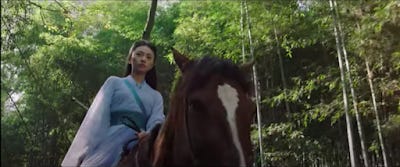
The word "puppet" 傀儡 is first given focus in relation to Jian's visit to Changle Gambling House on Puppet Li's island. Jian's purpose is to find the whereabouts of Handy Tang, one of the Shenji Valley survivors from 8 years earlier. Puppet Li is so named for his renown in constructing mechanical devices and was sought after for his expertise in making sophisticated traps. When the ten that board the boat on this occasion make their way to the gambling house, this is the visitors' first view of Puppet Li as their host.
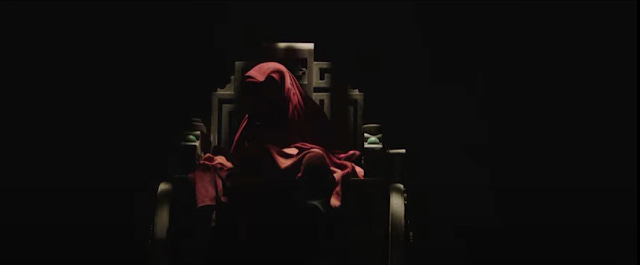
His facial expression and form is hard to make out from due to the hooded cloak and the surrounding darkness. At this first encounter, everyone presumes the voice and the figure seated on the wheel chair are genuine. It is surprising that no one seems suspicious of the dilapidated and dusty structure that they are ushered into. But perhaps all who are there are eager to enter into some kind of transaction with Puppet Li. Most, however, are not there for the treasure hoard that he is fabled to possess. They have specific requests unrelated to wealth. However, in order to get what they want from him, they are required to play his game. The game involves puppets, and the contestants need to find the puppets' missing pieces from around the room. Unbeknownst to the visitors, Puppet Li's game is a game show of death (patterned after Agatha Christie's And Then There Were None) of which the puppets are the lure.
The 6 puppets made in the image of 6 missing jiang hu personalities are a distraction and misdirection. A part of the theatrics of a mastermind with bigger fish to fry. It is revealed later that Puppet Li, without the smoke and mirrors, has been relegated to a ventriloquist puppet -- the skeletal remains of a man who was a reputed engineering genius.
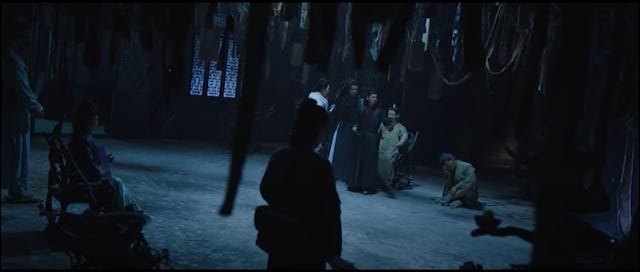
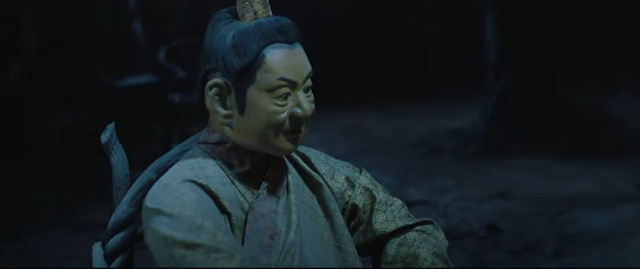
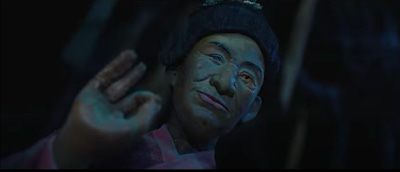
On this trip, Jian's vigilant protector and fellow traveller, Zhao Wo-huan inadvertently gets close to the assassin sect's spy Ming Yue and soon the two develop feelings for one another. On this occasion she takes the guise of a helpless mute girl while looking for a piece of crystal that contains the names of undercover agents belonging to the assassin's guild. The point of their romance is that at some level it serves as an instructive contrast to that of Jian and Zhao Shi-qi. Ming Yue is the willing puppet of her masters and remains so right to the bitter end. Despite falling for Zhao, she can't leave the guild behind because her relationship with it goes far deeper and she is still emotionally tethered to the organization. In effect, she is unable to cut the ties.
There are also other instances of body substitution in the story. In the third major case featured here, a series of murders take place at a gathering of top physicians who have come to treat a sickly wealthy businessman Mr Yin. The culprit cleverly attempts to deflect attention from himself by using a corpse he killed to frame another and to cause that man to believe that he has committed murder. A body swap and some high level martial arts are used for subterfuge. What's also interesting about that case is that the murdered men were reprehensible scoundrels using child beggars in an extended experiment to find the right drug for the wealthy Mr Yin. They were used, in our language, as laboratory rats or as insignificant vessels for a clinical trial. They could also be said to be puppets... dancing to the ugly tune of their controllers for their own ends. The idea of human rights was not accorded them because underpinning this ugly conspiracy was the idea of "might is right".
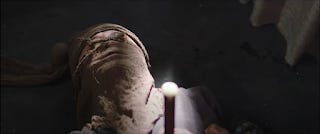
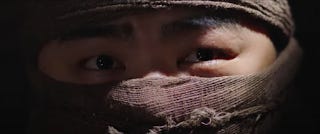
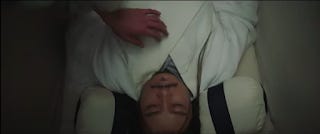
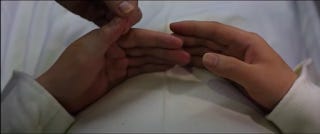
The physician Xiao Ye Ye who turns up at the gathering turns out not to be the genuine article but a character known as The Man of a Thousand Faces. The Pretender of jiang hu as it turns out. The real Xiao Ye Ye had died 8 years earlier. But this incarnation happens to be a quick study and has taken on various identities in his lifetime. He confesses that he has no personality of his own but he, like a shape shifter or an empty doll takes on the personality that most impresses him at a given time. Once again the puppet motif emerges.
On the outskirts of the Yan prefecture, the man who is named the Divine Archer has mysteriously disappeared. The simple villagers attribute this to a fox demon when his people find a pair of shoes which he purportedly left behind. Much later when Jian finally has all the necessary pieces in place does he realise that the Divine Archer's body was used to in Chief Bai Cao-ze's coffin (of the Mt Yan sect) as a substitute to give the illusion that Chief Bai has passed away. This is clearly meant to hide a much bigger agenda concerned with the Shenji Valley massacre 8 years earlier. Chief Bai's most senior student, Bai He, it is revealed, has been an undercover agent for the assassin's guild. Her identity was discovered by Jian Jin-huan years earlier but he allowed her to continue. She and the elder Jian knew that everyone would be after her blood including the assassin's guild. In her words, she was only a chess piece who's identity had been exposed. As long as she didn't act against her teacher, he would keep her identity a secret. Later she pays the ultimate price in the hands of Zhan Si for letting Jian go. When she is torn between her loyalty to the assassin's sect and her love for Jian Jin-huan, she acts of her own will knowing the consequences of her actions.
When Jian and his travelling companions arrive in Liaodong to seek information about the Shenji Valley event from the remaining survivor, they find themselves right in the middle of an internal leadership contest within the Santong Security Agency. In order to conceal his true motives to Jian, the second-in-charge usurps the leadership and installs a temporary "puppet" to assume the identity of the legitimate leader.
In a crazy twist in the body swap motif Boss Wang undergoes major cosmetic surgery and is now looking like a young man in a different body. He wants to retire and leave behind his responsibilities but doesn't think his usurper should succeed. He seeks the help of Jian and Co to regain his position in exchange for information about what happened at Shenji Valley 8 years earlier.
There are many aspects of the show I find fascinating but this is one that struck me when I thought a little more about the open ending and considered some comments I'd seen on the web. The implications are provocative because it feels that what is implied is that the body is a mere vehicle or vessel but the identity of the person is in the soul and the will.


